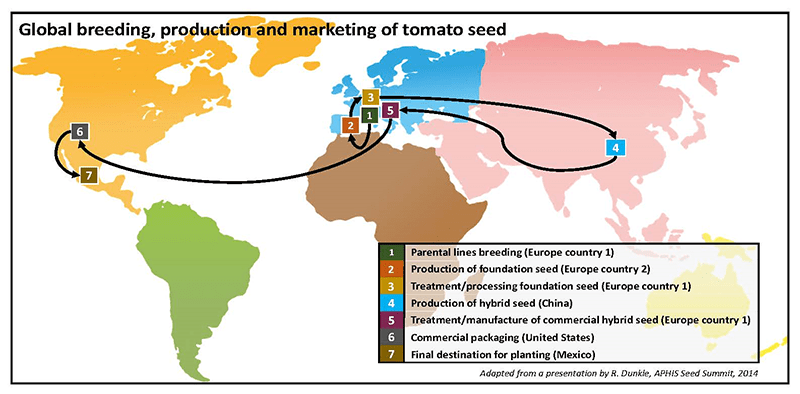Regulatory Framework for Seed Health (ReFreSH)
Healthy seeds are critical to the success of gardeners, farmers, research scientists, and businesses that develop new plant varieties. The international seed trade adds significant value to the global economy.
According to the World Seed Federation, global seed exports were worth nearly $14.4 billion in 2019. Imports were worth more than $13.8 billion that year. But a risk comes with those imports and exports: Seeds that move in global trade can carry invasive plant pests and diseases.
ReFreSH
To reduce that risk, USDA’s Plant Protection and Quarantine (PPQ) program developed the Regulatory Framework for Seed Health (ReFreSH) in collaboration with the seed industry, State and Federal officials, academia, and others. The ReFreSH project will result in a more effective and efficient program for managing plant health (phytosanitary) risk associated with international seed movements.
ReFreSH will accomplish that by identifying and leveraging current seed industry production and quality management practices that reduce overall pest risk. It will recognize these measures within the context of an PPQ-approved systems approach that accommodates all seed sectors and all sizes of companies. Systems approaches integrate different measures for pest risk management, at least two of which act independently.
Today’s international seed trade presents unique regulatory challenges. The seed trade business model is increasingly global with any given lot of seed potentially transiting through multiple countries.

The figure above illustrates movement of tomato seed in global trade:
- Country 1 (for example, France) breeds a new tomato variety and exports the breeder seed to Country 2 (for example, Spain).
- Country 2 (Spain) produces parental seed lines.
- Country 2 (Spain) ships the parental seed lines back to Country 1 (France) for treatment and processing.
- Country 1 (France) re-exports the parental seed lines to Country 3 (for example, China) to produce hybrid seeds.
- The seeds return to Country 1 (France) for treatment and production of commercial seeds.
- Country 1 (France) exports the seeds to Country 4 (for example, the United States) for packaging.
- Country 4 (United States) re-exports the seed to Country 5 (for example, Mexico), where it is planted.
In addition to this global business model, the volume and the different types of seed traded globally is also increasing. Over 300 different seed species and over 65,000 different varieties of seed are commonly traded.
Recent detections of pests like Tomato brown rugose fruit virus, Cucumber green mottle mosaic virus and quarantine pospiviroids have raised global awareness of seedborne pests. As new seed threats emerge, importing countries require more and more specific declarations of pest absence in traded seed. ReFreSH was conceived as a safe and more efficient alternative: a risk-based systems approach to leverage existing industry management practices for seed pests.
The vision is for a globally accepted system that satisfies phytosanitary certification requirements. Once implemented, ReFreSH accreditation will become an alternative option to the current system of consignment-by-consignment certification via inspection and testing. ReFreSH is based on the internationally recognized principles for reducing the risk of safety hazards in food. To verify seed health and make international seed movement safer, ReFreSH applies pest management measures at the eight critical control points in the seed production process shown above. The eight critical control points are:
- Pre-planting: Site selection and preparation
- Pre-planting: Plant and seed inputs
- Production: Pre-harvest (growing season)
- Production: Seed harvest
- Postharvest: Seed conditioning and treatment
- Postharvest: Seed handling and storage
- Postharvest: Seed quality testing
- Distribution and transport
When implemented, ReFreSH will shift the current focus of consignment-by-consignment inspection and testing. It will become a system where accreditation of producers and production processes forms the basis for phytosanitary certification.
ReFreSH Documents
To implement ReFreSH, PPQ, in cooperation with its industry, academic, and State partners, has developed several foundational documents:
- ReFreSH Concept Paper. The ReFreSH Concept Paper describes:
- The seed industry, global trade, and the need for ReFreSH;
- The biology behind seed as a pest pathway; and
- The process of designing ReFreSH, hazard analysis, and critical control points.
- ReFreSH Accreditation Standard (328.04 KB). The ReFreSH Accreditation Standard describes the essential elements of ReFreSH, outlines requirements for participation in the ReFreSH program, and explains participant roles and responsibilities.
- ReFreSH Participant Manual (575.7 KB). The ReFreSH Participant Manual specifies measures undertaken by the participating entity during seed production. It describes the procedures and processes they use to comply with the ReFreSH accreditation standard, and it is organized and worded to serve as an audit checklist. The ReFreSH Participant Manual is a template for entities to produce the ReFreSH Manual required as part of the accreditation process.
Contact Information
Please submit questions regarding ReFreSH to one of the following addresses:
- Email:ppq.nappra@usda.gov
- Mail: ATTN: ReFreSH Questions, Unit 133, IRM, PPQ, APHIS, 4700 River Road, Riverdale, MD 20737-1236
Stakeholder Registry
If you wish to be notified about developments regarding ReFreSH, please subscribe to the Animal and Plant Health Inspection Service’s Stakeholder Registry. Select the “Plant Health Information” category, then “Importations into the United States,” then “Entry Requirements Including Permits.” Check the box next to “Plants for Planting.”

